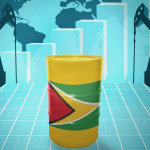
The Government will be moving to finalize its oil deal with the Total Energies Consortium, which includes Qatar Energy and Petronas, but may have to scrap its offer to some of the other winners of the country’s lucrative offshore blocks, if they are unable to meet the criteria set out in the new Production Sharing Agreement (PSA).
TotalEnergies is the only group that has received Cabinet’s approval from the list of six bidders, that submitted a total of 14 bids for eight of the 14 offshore blocks that were put up for public auction.
“The discussions are ongoing but I think they are nearing completion,” the Vice President told a news conference on Thursday.
Sispro Inc.; International Group Investment Inc. and Montego Energy; Liberty Petroleum Corporation and Cybele Energy; ExxonMobil, Hess and CNOOC; and Delcorp Inc, Watad Energy and Arabian Drillers are the other bidders that were successful in their bids.
Singling out Exxon Mobil and its partners, the Vice President said while the group has raised concerns about some of the non-fiscal terms in the new PSAs, other bidders have difficulties accumulating the substantial fees, and are in search of new partners.
These challenges, he said, have stalled negotiations.
“Some can’t find the partners, some can’t raise the fees – the substantial fees they have to pay, the signing bonus. And with the Exxon Group, I think it is mainly about some conditions, particularly the non-fiscal conditions. So, these have not been concluded as yet,” Jagdeo said.
He said if the bidders are unable to meet the criteria set out in the new PSAs, the Government may very well have to abandon the process.
“If they can’t do so, we are not going to conclude with them, we might just have to abandon the process,” the Vice President said.
The Government had signaled its intention to host another bid round for its offshore blocks, but with no agreement signed to date from the first auction, is it unclear, when the other round will begin.
The Vice President said several factors are influencing the auctioning process.
“One, it’s the era. The era now that people are, particularly the large companies are very selective in the 70 odd auctions that are taking place around the world in how they get involved. Two, the capacity to finance exploration activities at this stage has been demised seriously globally. Thirdly, people, with IEA estimating globally oil at 2030, that a lot of people believe that if they explore even now, and they find reserves that these would be stranded, they may not be able to develop them, move to a project even if you discover. So, the international environment is impacting this auction globally in a serious manner,” he explained.
He said to compound the situation, in Guyana’s case, the PSAs, though competitive are not as lucrative as the Stabroek Block PSA.
Under the new model PSA, the royalty on all petroleum produced and sold by the contractor has been increased from 2%, as embedded in the Stabroek Block PSA, to 10%. It includes the retention of the 50-50 profit-sharing after cost recovery, however, a company would not be able to recover more than 65% of the cost at a time.











You must be logged in to post a comment Login